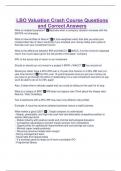Exam (elaborations)
LBO Valuation Crash Course Questions and Correct Answers
- Course
- Institution
What is multiple Expansion? Basically when a company valuation increase with the EBITDA not changing What is Internal Rate of Return? A time-weighted metric that tells you what your compounded rate of return would be if you invested your money today and it grew at that rate over your investment ho...
[Show more]



